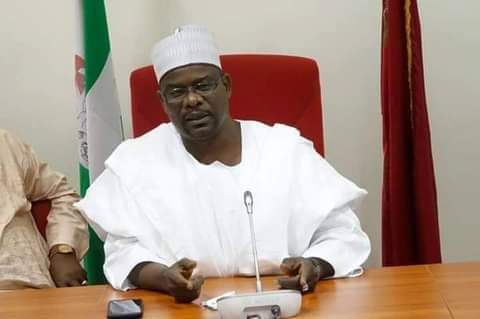Senate Chief Whip Ali Ndume has firmly dismissed claims made by ethnic jingoists, asserting that five of his grandchildren are of Yoruba descent.
Ndume’s statement comes as a response to accusations that he only advocates for the betterment of the Northern region.
Ndume passionately argues that if he held any animosity towards the Yoruba race, he would never have allowed his two daughters to marry Yoruba men.
Ndume’s reaction stems from comments made regarding the Central Bank of Nigeria’s (CBN) plan to relocate certain offices to Lagos.
Ndume clarifies that his intervention in this matter was driven by a sense of patriotism and not by any disdain for the Yoruba people.
Unfortunately, some individuals have used sections of the media to attack his character and question the credibility of his daughter, who is a staff member at the CBN.
Undeterred by these attempts to discredit him, Ndume firmly asserts that his role as a lawmaker does not prevent his children from pursuing careers in any government agency, as long as they possess the necessary qualifications.
Ndume emphasizes that these attempts at subtle blackmail will not hinder him from pointing out deficiencies in the government.
In fact, Ndume said he sees it as his duty to assist President Bola Ahmed Tinubu in achieving success.
Ndume said he remains resolute in his commitment to speak truth to power and to address any errors made by those responsible for governing the country.
Ndume challenges those who criticize him and accuse him of harboring negative sentiments towards the Yorubas to demonstrate their pan-Nigerian credentials.
Ndume proudly reveals that both of his daughters are married to Yoruba men and have blessed him with five Yoruba grandchildren.
He firmly states, “My two daughters are married to Yoruba men and have both given me five Yoruba grandchildren,” Ndume said urging ethnic jingoists to showcase their commitment to a unified Nigeria.
Ndume makes it clear that he has no regrets for criticizing the plans of the apex bank to relocate its offices from Abuja to Lagos.
Instead, Ndume calls on the CBN Governor to prioritize stabilizing the country’s monetary situation, particularly the escalating exchange rate and rising inflation, rather than focusing on the relocation of departments to an already densely populated Lagos State.
As a senator, Ndume said he believes he has the right to make necessary interventions.
Ndume takes the opportunity to clarify that he does not speak on behalf of the North or Northern senators but rather in the best interests of all Nigerians and President Tinubu, whom he deeply respects.
“I stand by what I’ve said about the relocation of FAAN and some departments of the CBN to Lagos State. If it is about decongestion, Lagos is not the right place. There are CBN offices in all the states of the Federation. Why move the departments to Lagos, which is already populated?’ Ndume asserts.
Since voicing his concerns, Ndume has faced unwarranted attacks in a particular newspaper, with false accusations that he harbors hatred towards the Yorubas.
Ndume dismisses these accusations as baseless and asserts that his daughters’ marriages to Yoruba men, one from Lagos State and the other from Kwara State, along with his five Yoruba grandchildren, are clear evidence of his love and acceptance of the Yoruba people.
Ndume questions those who accuse him, asking how many of their own sons and daughters are married to Hausas or Northerners.
Ndume proudly declares, “I’m a true Nigerian.”











